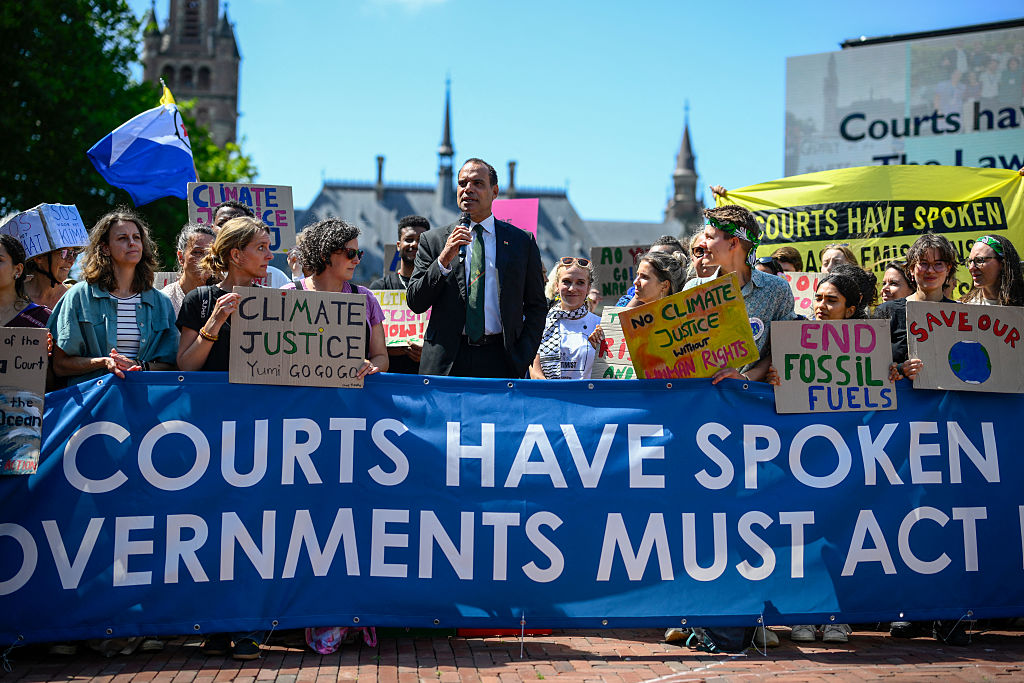The International Court of Justice (ICJ) delivered a landmark unanimous advisory opinion on Wednesday, addressing the legal obligations for countries to address climate change under international law.
Climate change poses an “urgent and existential threat” to all states, the court said. Countries have a legal duty to protect current and future generations from environmental harm, including rising global temperatures. All nations must cooperate together to solve this challenge, it said, with wealthier countries obligated to help developing countries adapt.
[time-brightcove not-tgx=”true”]
The landmark case is the largest to be seen by the world court, and is expected to provide a legal blueprint for the responsibility of countries to address climate change. The case was brought forward by Vanuatu and other Pacific Island nations, after a youth-led movement in 2019 campaigned for it to be brought in front of the ICJ.
In its deliberations, the court was asked to answer two questions: What obligations do states have to ensure the protection of the climate for present and future generations? And, what are the legal repercussions for states which fail to meet these obligations, and cause harm?
The court’s reasoning addressed several major legal issues, including the scope of states’ climate obligations, how human rights obligations should shape climate policy-making, the right to reparations for developing countries bearing the worst impacts of climate change, the establishment of preventive and precautionary principles for climate mitigation, equity in states’ response to climate action, and the obligation to phase out fossil fuels.
“This opinion is not just about what countries have to do in the future,” says Nikki Reisch, climate and energy program director at the Center for International Environmental Law. “It is about the past, present, and future of climate action, and crucially, it’s about recognizing that we can’t solve this mounting climate crisis without confronting its roots, that past emissions matter, and that loss and damage already endured must be recognized and repaired.”
Among the many details in the court’s opinion, it determined that once a state is established, the disappearance of one element cannot undermine its statehood—providing protection for small island states facing rising sea levels. It also declared that a clean, healthy and sustainable environment is a human right and that states have an obligation to regulate private actors. While not named specifically, this could include oil and gas companies.
Last December, the ICJ heard from a record number of states and international organizations on the case. “The global majority of the world was aligned in their demand for climate justice and accountability,” says Reisch.
However, submissions largely reflected two views: those arguing for expanding the applicable law beyond existing climate treaties, and those advocating for a narrower view. The United States and the United Kingdom were among the states that argued for a narrower legal approach, arguing that the legal obligations of states are outlined in the Paris Agreement. And while the U.S. under President Trump is in the process of withdrawing from the Paris climate deal, some legal experts argue that today’s ruling deems that move illegal.
The opinion comes on the heels of two other landmark climate opinions. Last year, the International Tribunal for the Law of the Sea issued an advisory opinion affirming that countries must “take all necessary measures to reduce, prevent and control” emissions. Earlier this month, the InterAmerican Court of Human Rights issued an advisory laying out the obligations of states to respond to the climate emergency under human rights law.
Advisory opinions are not legally binding, but the decisions provide a legal framework that is expected to bolster climate litigation around the world. “It will become all that much more difficult for states to say that the rules don’t apply to them because it will really show that the breadth of international law points to accountability and justice,” says Reisch.
“A complete solution to this daunting and self-inflicted problem requires the contribution of all fields of human knowledge, whether law, science, economics or any other. Above all, a lasting and satisfactory solution requires human will and wisdom at the individual, social, and political levels to change our habits, comforts, and current way of life in order to secure a future for ourselves and those who are yet to come,” said Judge Iwasawa Yuji, President of the Court, as he delivered the opinion.
What’s more, Reisch says that the fact the case made it to the world’s highest court already shows where the global majority stands on climate action: “It’s important to underscore that this process has already made history with the very fact that Pacific Island states facing an existential threat and the youth movement from around the world have not only gotten the attention of the world’s highest court, but have shown that the global majority is aligned in demanding that big polluters cease their destructive conduct and be held to account.”

